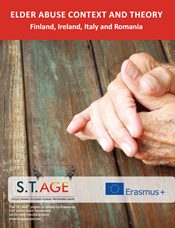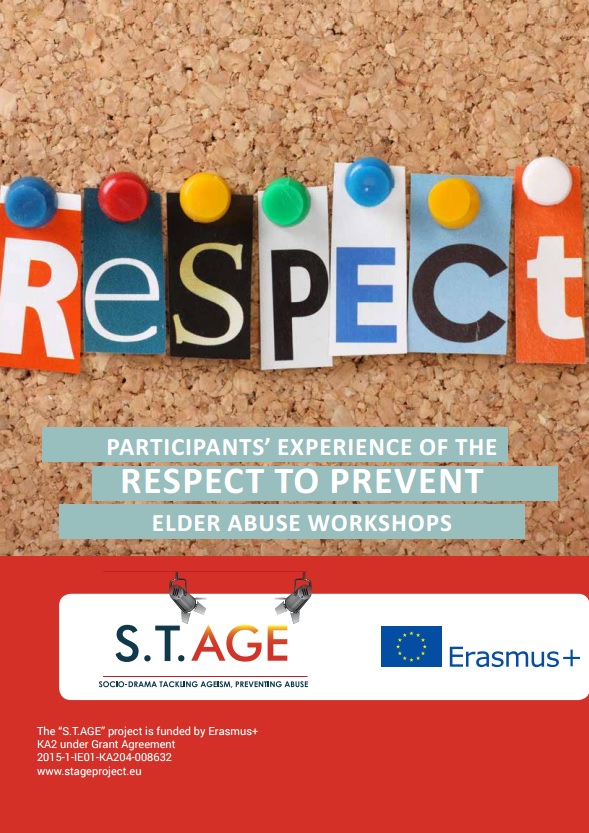Background
Age Action, along with partners in Ireland, Finland, Italy and Romania, was successful in obtaining funding under the Erasmus element of the European Commission’s Lifelong Learning Programme to address the issue of elder abuse.
The Erasmus project is an extension of the Grundtvig project. A fifth partner in the Erasmus element of the project is the Gaiety School of Acting in Dublin, the national theatre school of Ireland. The Gaiety School of Acting is a leading acting school who brings unique skills and experience in supporting community development and addressing social issues through drama workshops.
The project is entitled S.T.Age, which stands for Socio-drama Tackling Ageism.
A brief overview of S.T.Age is provided below with further details available on the Erasmus Combating Elder Abuse website here.
Overview
The percentage of the population, 65 years and over is estimated to increase in Europe from 16% (2010) to 25.6% by 2040.
Elder abuse is a European wide issue that has the potential to impact on the lives of a growing number of people.
Ways of educating older people themselves and those that provide care and support to them are hugely important if people are to lead dignified, secure and fulfilled lives as they age. A significant body of empirical evidence points to deficits in awareness, knowledge and confidence among health and social care professionals in relation to elder abuse and documents the limited provision of education and training in the area.
This project applies in a practical way, for the first time we are aware of, the theory of ‘generational intelligence’ (Biggs, 2014). Emerging theories in explaining elder abuse within individual relationships suggest abuse occurs where there is a failure to encounter the humanity of the other. Biggs’ hypothesis is that prevention needs to focus on building generational intelligence. The principle of this theory is that by recognising differences between generations, there is greater empathy amongst carers, many of whom come from different cultural backgrounds. They come to know the older person as an individual, and therefore, not only provide care to the person and but also care about them.
Traditional learning opportunities focused on elder abuse may be ineffective or rejected by the target group, as abuse can be unintentional due to lack of awareness and the taboo nature of topic. Hence the methodology will use creative tools including socio-drama to deliver the programme in day care centres and residential settings.
Objectives
The objectives of this project are:
- to design an education programme that will provide new learning opportunities in the field of human rights and empathy to prevent abuse;
- to empower older adults though education on human rights and the exploration of ways of safeguarding well-being;
- to foster empathy amongst formal carers by ‘walking in the older person’s shoes’ and challenging ageism;
- to develop educators competences on the topic;
- to input into the elder abuse policy of care settings
Target groups
The target groups to be addressed are:
- older people attending/living in care settings, providing them with knowledge of their human rights and ways of using this knowledge to safe guard their well-being;
- formal carers, supporting them to build empathy, challenge ageism and increasing their capacity to create an environment of mutual respect, preventing elder abuse and empowering disclosure.
The transnational element of the project is also important as countries involved represent different social models but are also at different stages in the development of elder abuse policy and practices, engendering shared learning.
Project will meet common need of all EU countries to find new ways to educate, and provide older people and formal carers with the skills to protect themselves and those they care for.
Outcomes
The study aims to provide examples of practices in the use of drama as a means of addressing social and cultural issues.The project will also provide nursing home/long-term care homes and day centres with an opportunity to engage with their national organisation in developing their own elder abuse policy and protocol based on the outcome of the learning sessions.The main output from the project will be the development of education programme based on the use of drama as a means of addressing sensitive topics and supporting empowerment.Output 1: To set the context, the project will produce an ebook on elder abuse reflecting the background of elder abuse from the perspective of all participating countries, constructing the theoretical background underlying the approach taken in the project.Output 2: Workshops using sociodrama and other creative ways of raising awareness amongst older people of their human rights and building empathy amongst formal carers, including a handbook to aid deliveryOutput 3: A report on piloting these workshopsOutput 4: Setting up a learning platform that will incorporate the various tools developedDuring the project, intermediate expected results are:
- an increased capacity of member organizations to have a concrete impact on elder abuse prevention at local level;
- a strengthened capacity to respond to the specific needs of the target group, using sociodrama methods as an active learning activity capable of informing people of their rights and developing generational intelligence in a sensitive and not-threatening way;
- an increased awareness on the impact of the quality of inter-generational relationships in the context of elder abuse.
S.T.age ebook
The S.T.age ebook "Elder Abuse Context and Theory", produced by the Erasmus Project on Elder Abuse in conjunction with the Gaiety School of Acting and partners in Italy, Finland and Romania is now available to download.
Participants' experiences of workshops
A report on the experiences of the more than 200 care workers and residents who participated in 12 socio-drama workshops in four different countries is now available to download.


